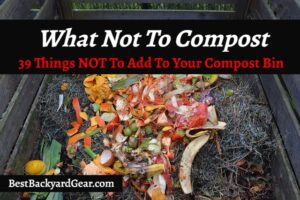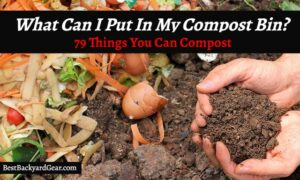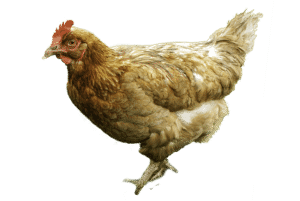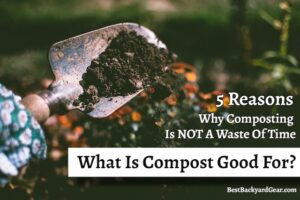 Compost is often known as “gardener’s gold” by those who faithfully collect, cure, and use it on their gardens. To many others, however, the idea of saving your kitchen and garden scraps to add to a rotting pile just seems like a smelly waste of time.
Compost is often known as “gardener’s gold” by those who faithfully collect, cure, and use it on their gardens. To many others, however, the idea of saving your kitchen and garden scraps to add to a rotting pile just seems like a smelly waste of time.
Who is right? Is composting a waste of time? If it’s not, what is compost good for? What makes compost valuable? What can you do with it? Let’s take a look.
Compost Improves Soil Health
Good garden soil is full of nutrients that will help your vegetable plants and flowers be as healthy and full as possible. Good soil is a HUGE component of good plant growth. When you compost, and add that nutrient-rich, dark soil from the bin to your garden beds, you are boosting the health of the soil, helping it maintain a neutral pH, which in turn improves the health (and taste) of your plants.
Because compost improves the health of the soil so greatly, it eliminates the need for synthetic or chemical fertilizers, instead giving you organic, healthy, natural fertilizer. Very few people are ok with heavy or synthetic chemicals in their diets – organic compost allows you to cut out chemicals at a base level.
Compost Improves Soil Structure
Organic matter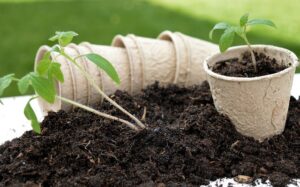 in compost, when decomposing, binds itself to soil particles (including whatever sand, silt, and clay there is by default), to form small “crumbs” (aggregates) of soil. This thick, crumbly soil is what you want. It’s what is considered “good structure”.
in compost, when decomposing, binds itself to soil particles (including whatever sand, silt, and clay there is by default), to form small “crumbs” (aggregates) of soil. This thick, crumbly soil is what you want. It’s what is considered “good structure”.
The reason why you want “crumbly” soil (instead of soil that is over sandy, silty, or clay-like) is three-fold:
- The clumps force the existence of tiny air pockets in the soil between the crumbs. Air means oxygen, and plant roots need oxygen to thrive.
- The plant roots also need water, and those “crumbs” allow for water to move through the soil, but not drain away too quickly to benefit the plants.
- The roots of the plants are able to grow more quickly and fully in oxygen rich, moist soil that has space for them to move.
Composting Helps Soil Retain Moisture
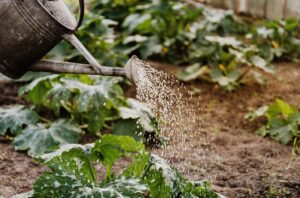
When you add compost to your soil, the improved structure (as just discussed) means the nutrient rich, thick and crumbly dark soil helps hold in water much better than thin, tired, “sandy” soil does. Which means that your garden soil won’t dry out as fast… and you won’t have to water it as often. You see, compost gives water something to “stick to”, instead of “drain through”.
Because of this, a garden with soil boosted by compost will have great drainage compared to a garden without it. Water won’t pool up, nor will it drain away – rather, it’ll settle nicely into the soil and do it’s thing.
Composting Reduces Waste
If everyone were to throw all of their organic waste into the trash bins, the landfill sites would be a lot fuller than they already are! Composting is definitely a “save the planet” type activity, reducing waste. 🙂
Side note: Organic waste (compost) tends to release potent greenhouse gases when rotting on landfill sites, which are harmful to the environment. Composting allows the decomposing to be done safely and without the noxious gases. Win, win.
Compost Reduces The Potential For Soil Erosion.
When you have healthy, thick, rich soil, it stays put. It’s heavy, unable to be blown away during a wind storm. And it won’t slide down the slope of a garden on a hill during a heavy rain fall. You’ll get longer use of the soil.
There are currently some studies being done on the effects of using compost to combat soil erosion on a larger scale for big landscape projects such as at the side of highways. Read more about them here.
So, what is compost good for? Improving your garden soil’s overall health, improving soil structure, improving moisture retention, reducing waste, and combating soil erosion. 5 reasons why composting is well worth your time! Why not get started today?
If you want to learn more about composting, check out:
- What Not To Compost: 39 Things Better Trashed
- What CAN I Put In My Compost Bin: 79 Things You Can Compost

